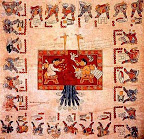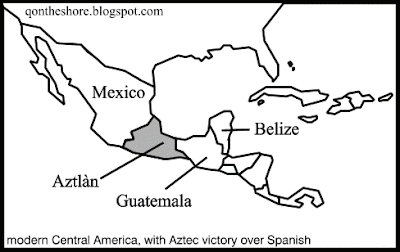And to think I was going to do one of these every weekend! This will be an occasional series (see previous editions
here and
here exploring counterfactuals or "what-ifs" -- imagining the rollout of history had a key event gone in another direction. Today's, possibly this month's what-if concerns the near-miss which allowed Spain an easy conquest of what could have been their most formidable foreign threat: the Aztec Empire.
Along most conventional measures, the Aztecs were the best prepared civilization to resist the European encroachment. They had a somewhat mature polity, a series of city-states united around a center in loose empires similar to the Greek
Delian and Peloponnesian Leagues. However, in the Aztec case, these groups were united rather than opposed in the so-called "Triple Alliance".

Aztec culture centered on the great city of Tenochtitlan, a metropolis centered on an island amidst an artificial lake (the legend of its founding is enshrined in the Mexican flag today). The picture at right from the
University of Wisconsin shows a spacious, designed urban center. This thriving community had between 200,000 and 400,000 people today -- larger than the conurbations of
Anchorage, Alaska or Utica, New York. They had systems of mathematics and writing. Aztec warriors were fearsome fighters who earlier had served as mercenaries. Their
atl-atl spear thrower was quicker to "reload" than primitive Spanish muskets while just as deadly. Atl-atl javelins could pierce metal armor.
If you're not familiar with the story, Aztec religion told that in the past their chief god Quetzalcoatl had been incarnated and walked among them. Someday, that incarnation who went by the name Topiltzin would return to lead them again. This may sound familiar. Topiltzin would be recognizable through his odd appearance: a beard, blue eyes, and pasty skin. To an Aztec who'd only met Caribbean and Mesoamerican peoples, this was a bizarre description, equivalent to modern people awaiting a savior with antenna, chitlin armor, and the ability to emit sparks.
So, what did the Spanish leader and butcher Hernan Cortez look like when he stumbled into the region with his men? That's right: pale skin, beard, blue eyes. It went downhill from there. The amoral Spaniard exploited the Aztecs' mystifying worshipfulness of their lightly armed force to kidnap and eventually kill the Aztec emperor Montezuma. A nighttime raid on the leaderless and rudderless Aztec capital resulted in a hard-fought Spanish victory.

Don't get me wrong...there were other reasons for Cortez's victory. Their introduction of smallpox killed over
three million people, a toll raised by deaths from measles and other diseases. The alliance between Spain and the Aztecs' enemies such as the
Totonac also closed the tactical edge, as did Spanish armor and cannon. Nor we can we discount their horses, which would have represented the first encounter Aztecs had with beasts of burden, whose knowledge of large animals had heretofore topped out at jaguars. However, it's the decapitation of Aztec leadership and subsequent unsurety of the population that sealed the deal.
So what if Cortez had manifestly
not been an Aztec god? What if he had darker skin and eyes? How would his force of some
couple thousand men have made out?
To their advantage, their edges in weaponry, allies, and disease would remain the same had Cortez not received immediate adulation. Nor is it unthinkable that he'd have gained access to the Aztec leader anyway, going off the example of his partner in genocide Francisco Pizarro, who managed to kill off the Incan leader further southward. But saying that the Spanish don't have an "easy in" to Aztec civilization, what then?
Well, a straight Spanish v Aztec battle would have been resolved in the Aztecs' favor. The Aztecs had a
300 to 1 advantage, and the gap in weapons technology wasn't nearly large enough to compensate for that. Even with their allies, the Spanish could expect to be outnumbered a good 10 to 1 by the most vicious fighters in the Americas at the time. We know, among other things, that the Aztec fighters had little trouble routing the Spanish bridgehead in Veracruz.
Say the Spanish are killed. Wiped out by the Aztecs. Now the Aztecs know about the Spanish, but the Spanish remain ignorant of the Aztecs' existence and their horde of gold. While those diseases are still working on the Aztecs, there will now be a greater measure of preparation when the Spanish return.
For the Spanish would return. The tide of European exploration and conquest broke across American shores from Tierra del Fuego to Newfoundland. The true question is this: would an Aztec civilization forewarned of Spain's arrival yet weakened by Spanish diseases, have put up enough of a fight?
The Aztecs would have been hampered by the religious lens through which they viewed the world, and one can imagine an accelerated series of sacrifice and ritual in reaction to the Spanish' arrival, rather than further fortification and training. There is little reason that the Aztecs would figure out that they were opposing a determined enemy who sought assimilation, if not extermination.
However, given the difficult terrain of Mesoamerica and the Spanish's general ignorance of indigenous culture and politics (something at which the French and British proved skilled), conquest of the region could have come at a high price. Given that Spain's window of conquest closed before European technological advantages produced rifles and the like, the Aztecs could conceivably have fought a war of attrition whose costs were beyond Spain's liking. Their style was more suited to guerrilla campaigns, and the Spanish long had greater interests in resource extraction in this locale than in colonization.
With a mature polity managing the war against Spain, the Aztecs could just maybe have waited until Spanish collapse at home. Assuredly, Spain would dominate the northern portion of modern-day Mexico, and likely a good part of Central America. A smaller rump state of Aztlàn (land of the Aztec) sandwiched between a larger English Belize and Spanish Mexico would have a shot after the wars of liberation.

Aztec animist beliefs would have poor chance of surviving the immersion in Catholicism, though the merger of state and church would not have been guaranteed in such a diverse society. For much of time, Aztlàn would retain an air of mystery and intrigue, the hemisphere's own Papua New Guinea. That uniqueness would make for an anthropologically and culturally fascinating contrast.
The subtraction of Aztlàn changes the divisions of the Spanish Empire, and thus the borders of their successor independent states (a map below is a theoretical approach to the area in modern times). A smaller and presumably weaker Mexico, deprived of Mexico City is even more subject to American whims. Texas's war of independence is yet more one-sided, and American domination of the Southwest is even more extensive. Pancho Villa is an unknown, and American troops enter World War One even less prepared, without the field experience gained from their pursuit of him.
The addition of an empowered indigenous ethnicity would severely alter the course of Central American history, though the process of economic and technological catch-up would leave it vulnerable to the same foreign meddling that the entire region experienced in the 20th century. A further divided Central America makes the Cold War "influence game" even worse on that region, and Aztlàn would likely alternate between vicious American-sponsored thugs and vicious Soviet-sponsored thugs.
The modern viewpoint of this part of the world is "Mexico and Central America", given their religious, linguistic, and historical common ties. Mexico of course has the largest economy and population, and thus the largest voice in the region. Without the large Mexico, Central America becomes less differentiated, and less an interest for American policy. Central America would be prone to enter South American orbit more, and the American focus would remain more strongly in the other hemisphere.
The Aztecs probably represented the best shot at aboriginal contest of European expansion. Given local antagonisms, it is doubtful that the Aztecs would lead a regional resistance to the Spanish incursion, but their strength in a fair fight would likely leave them outside the sphere of direct Spanish rule. A polity of the modern era rooted almost entirely in indigenous culture would not accrue most moral authority (one doesn't see such in Ethiopia or Thailand, also rare resistors to colonization), but would add variety to modern-day Latin America, and contribute to a
de facto isolation of Mexico in its development from the Catholic Hispanic culture of Latin America.


